Thomas James Richards, Diaries, Transcript Vol. 1, 26 August 1914 to 24 April 1915 - Part 10
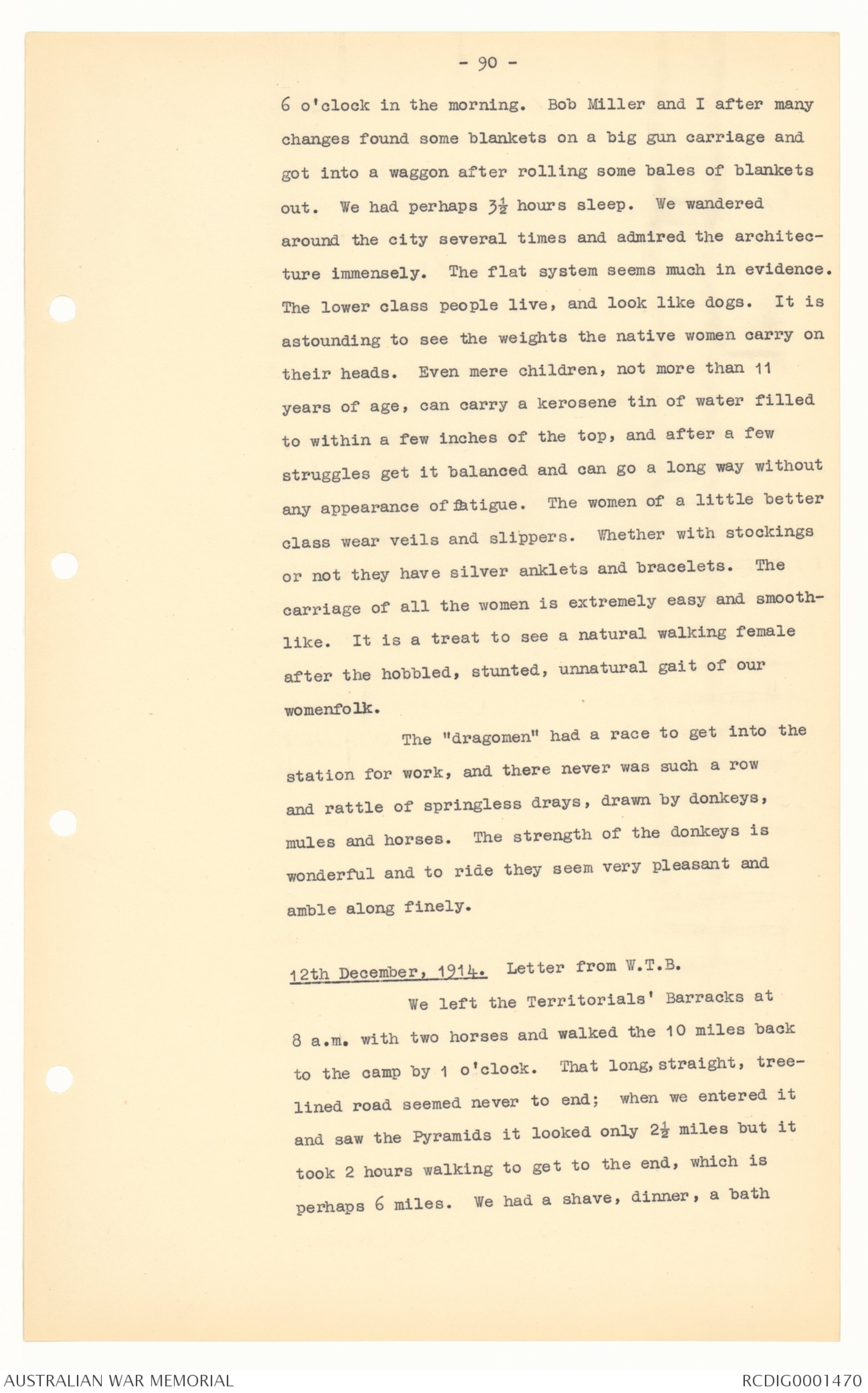
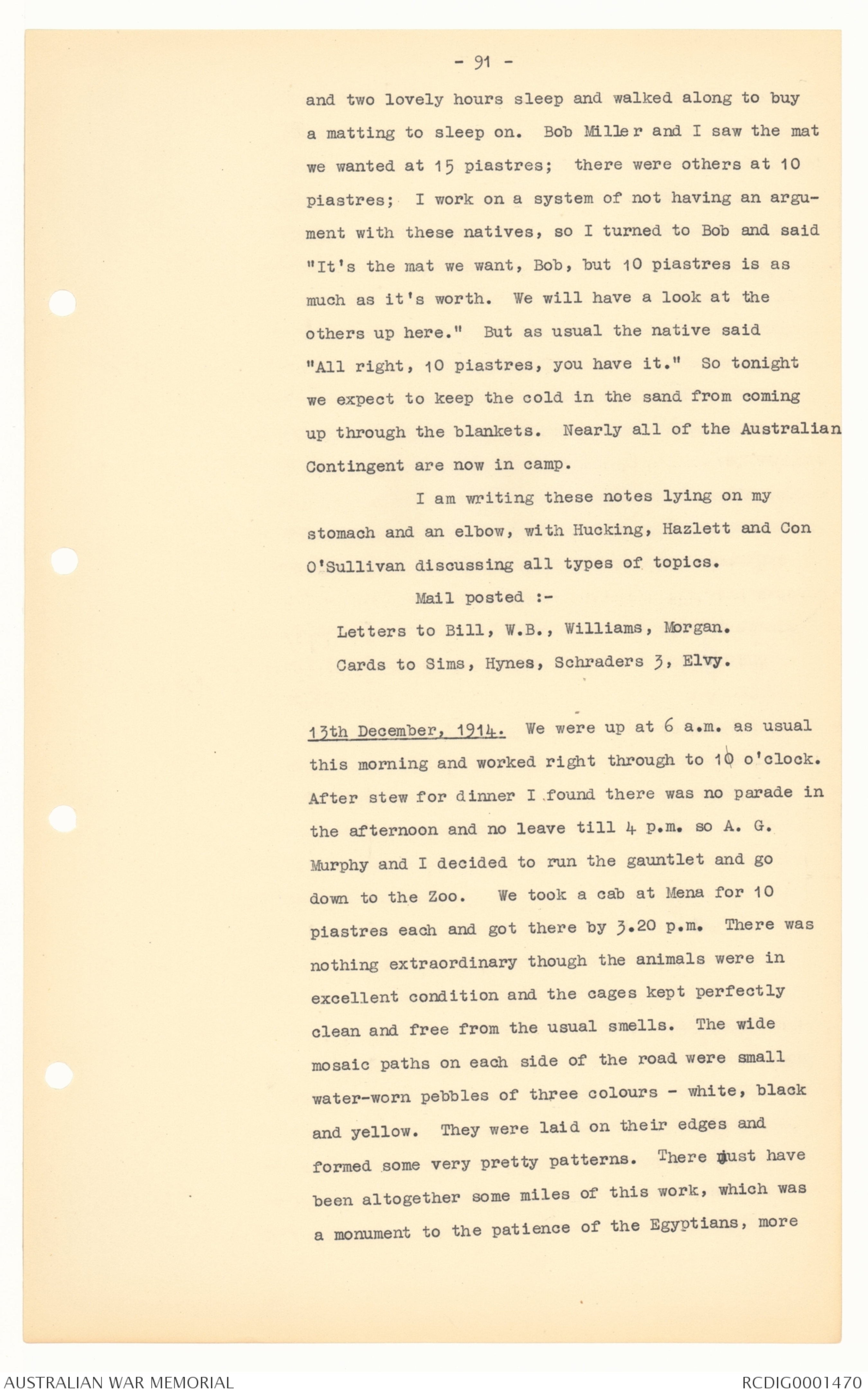
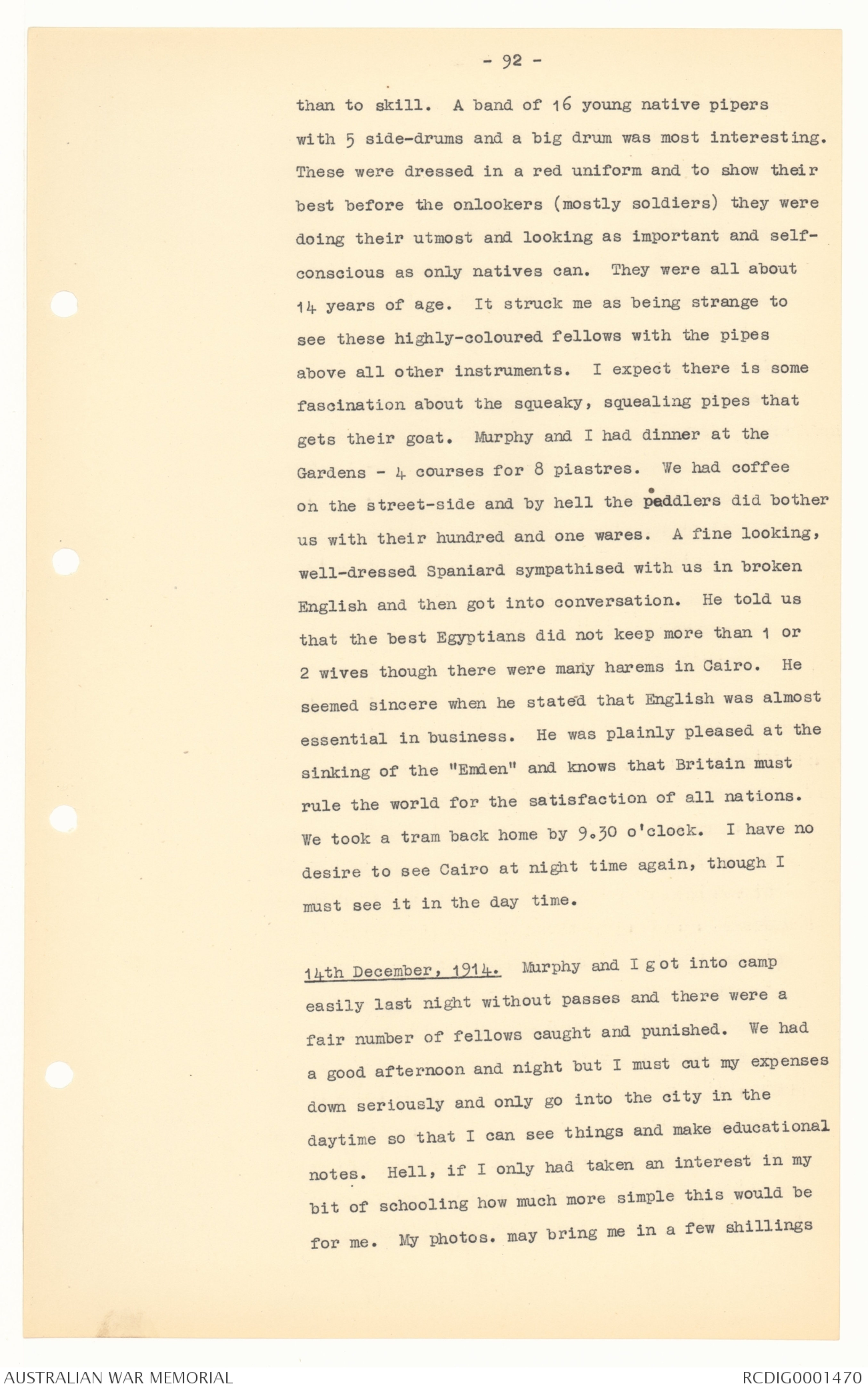
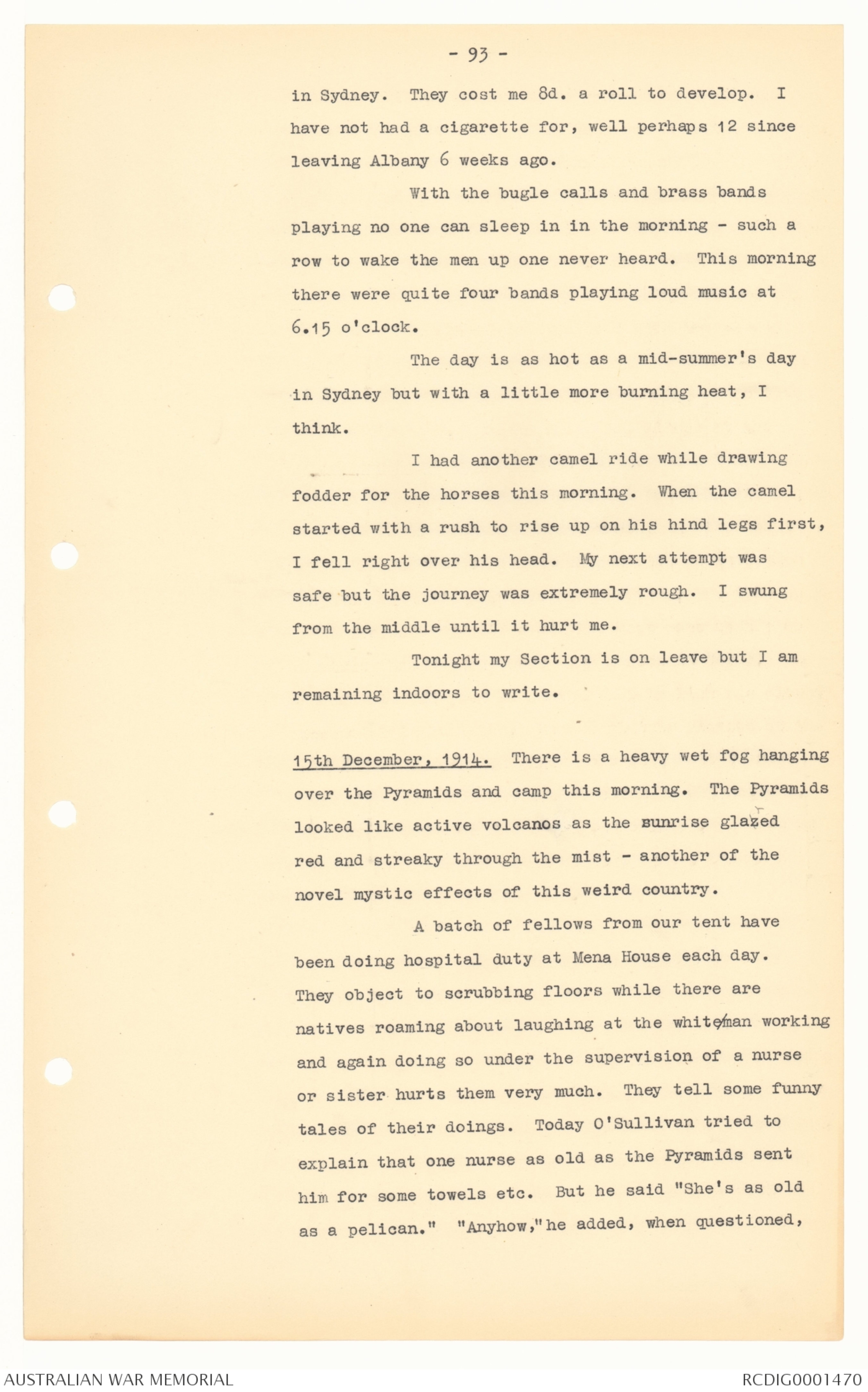
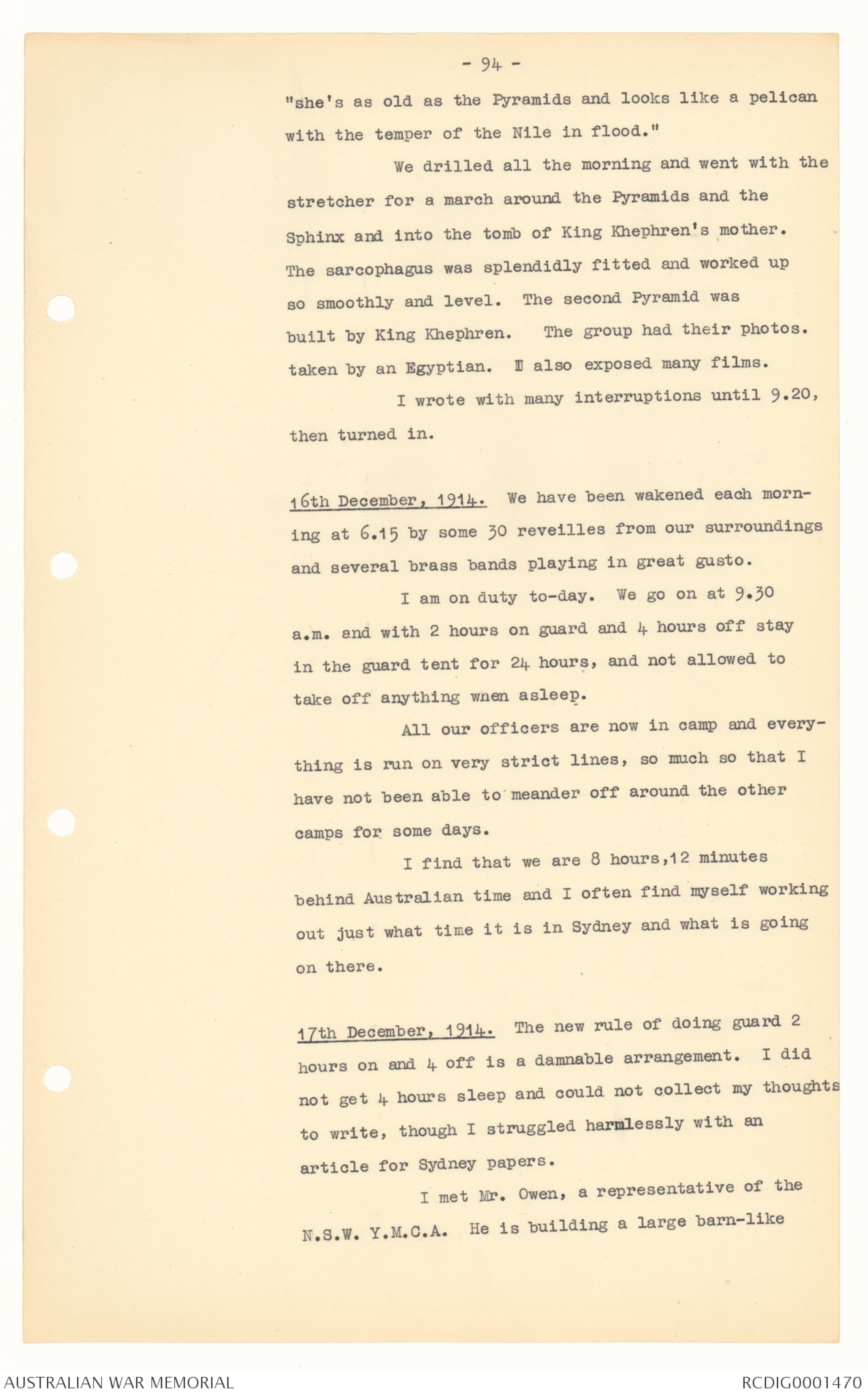
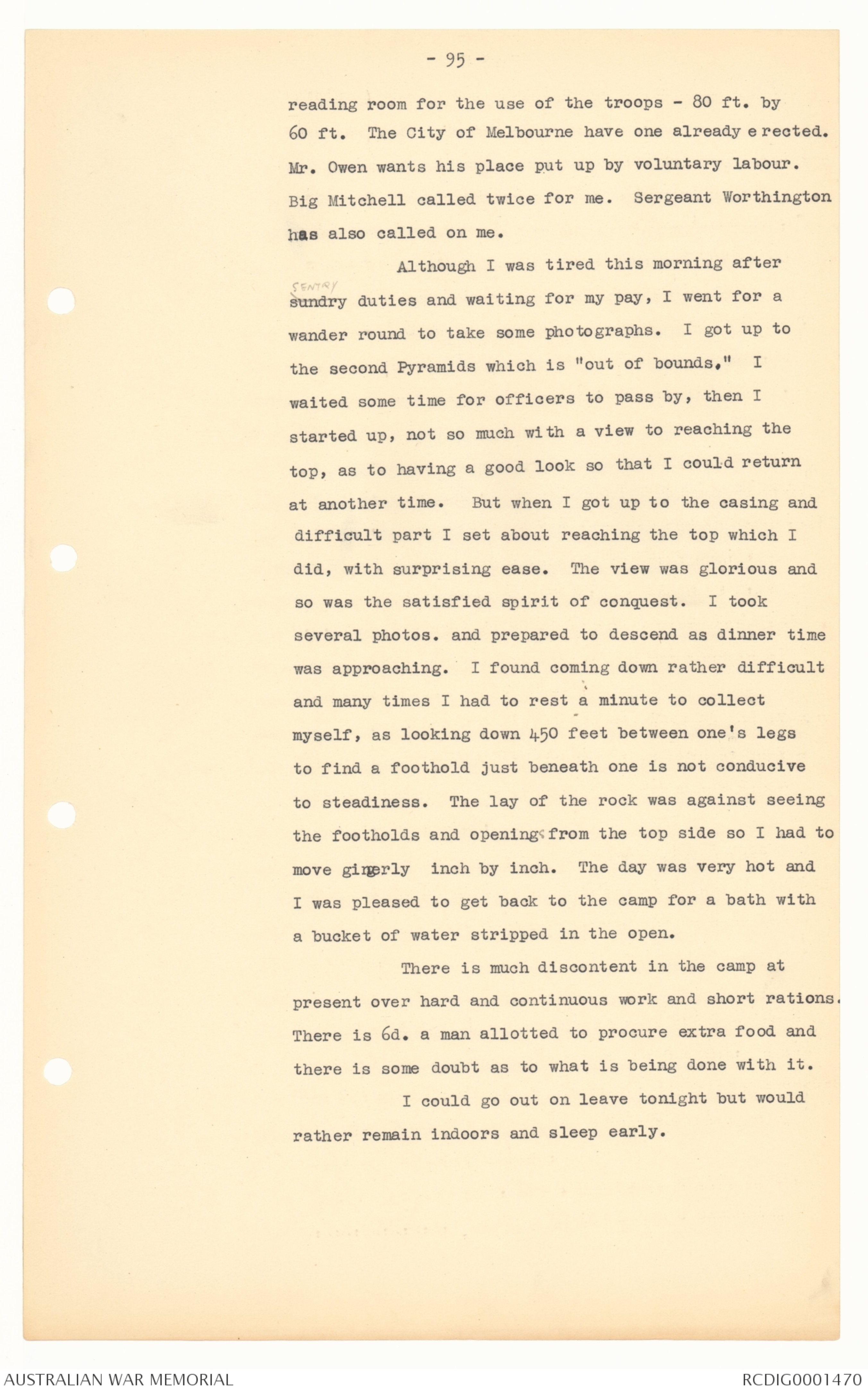
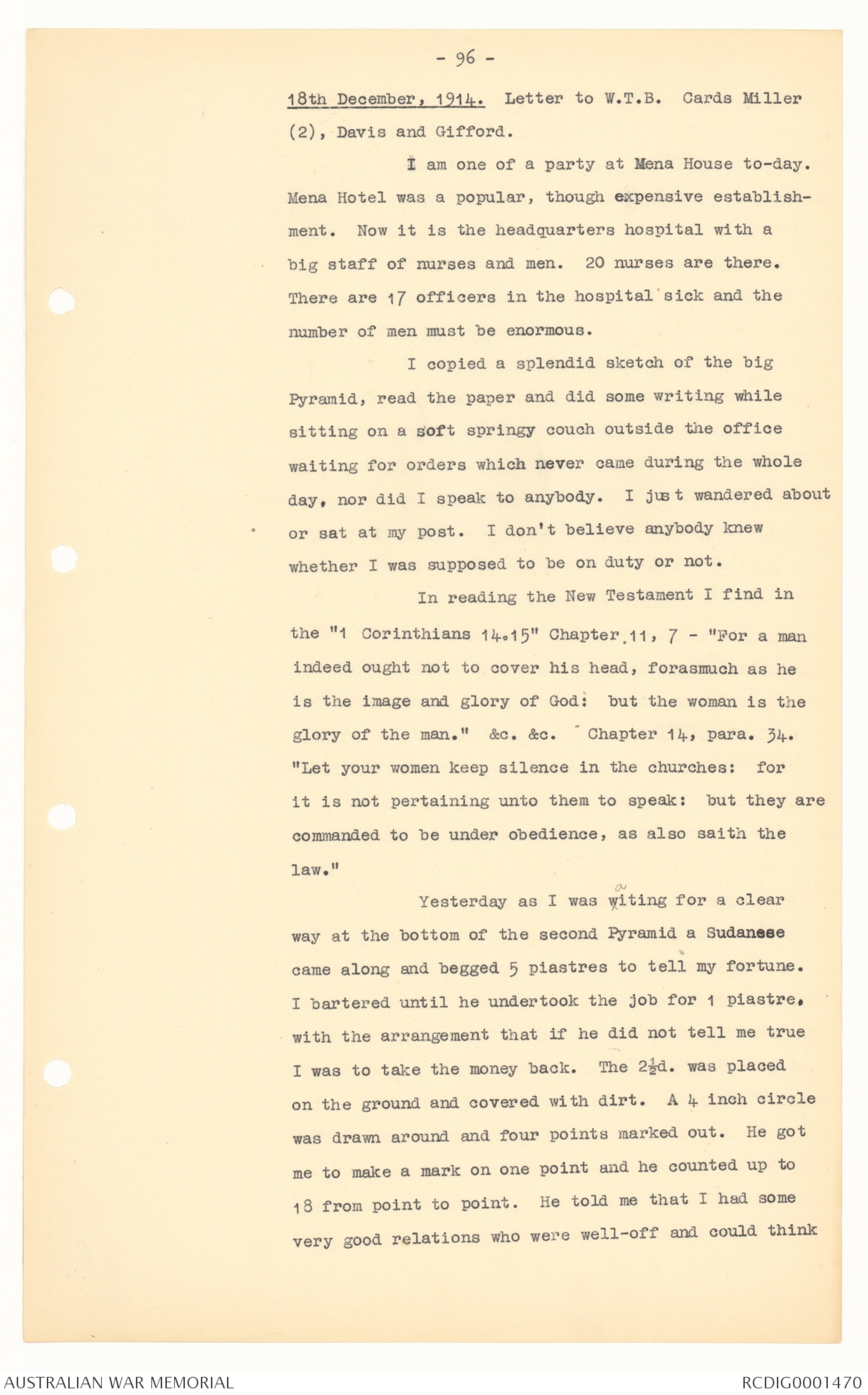
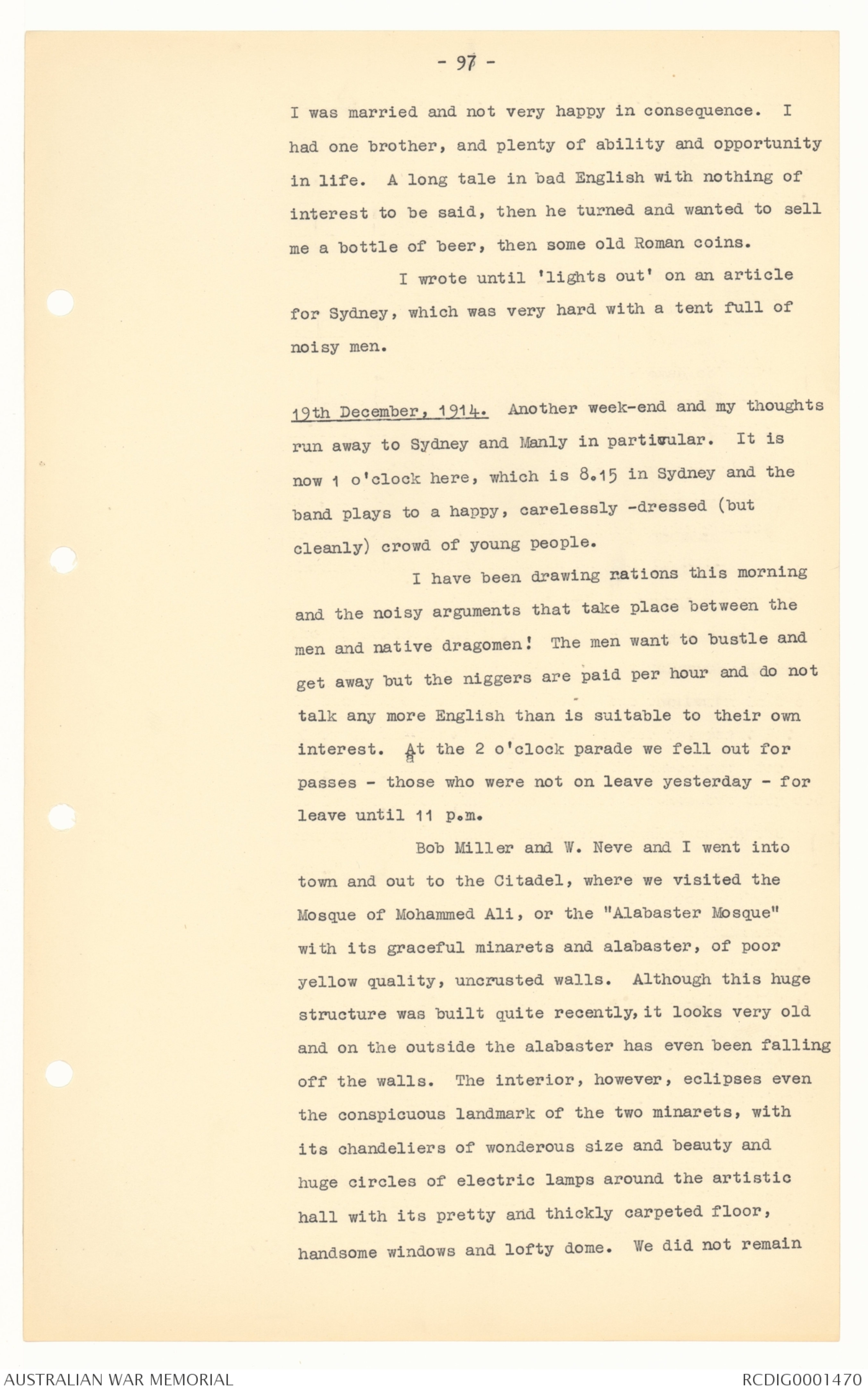
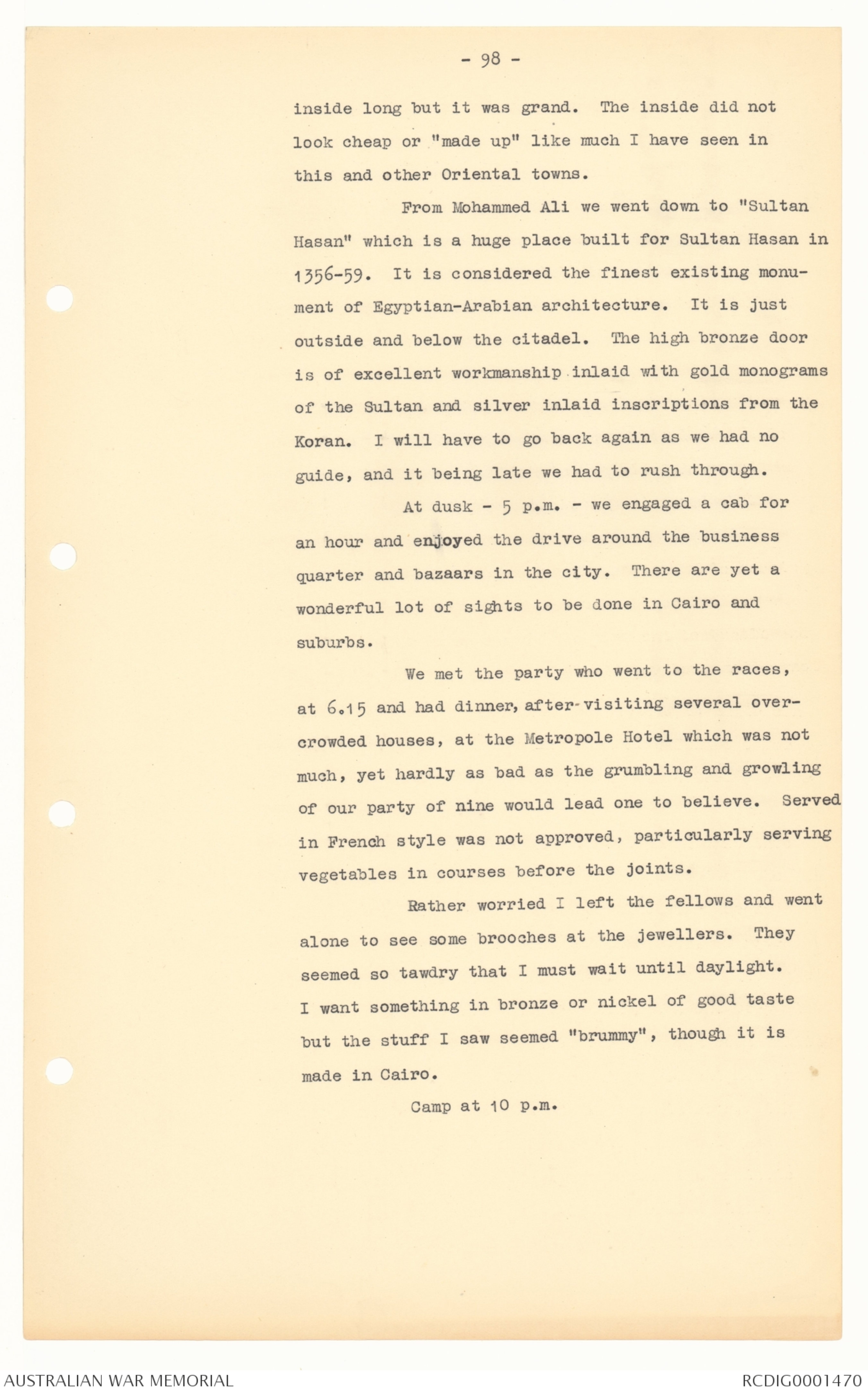
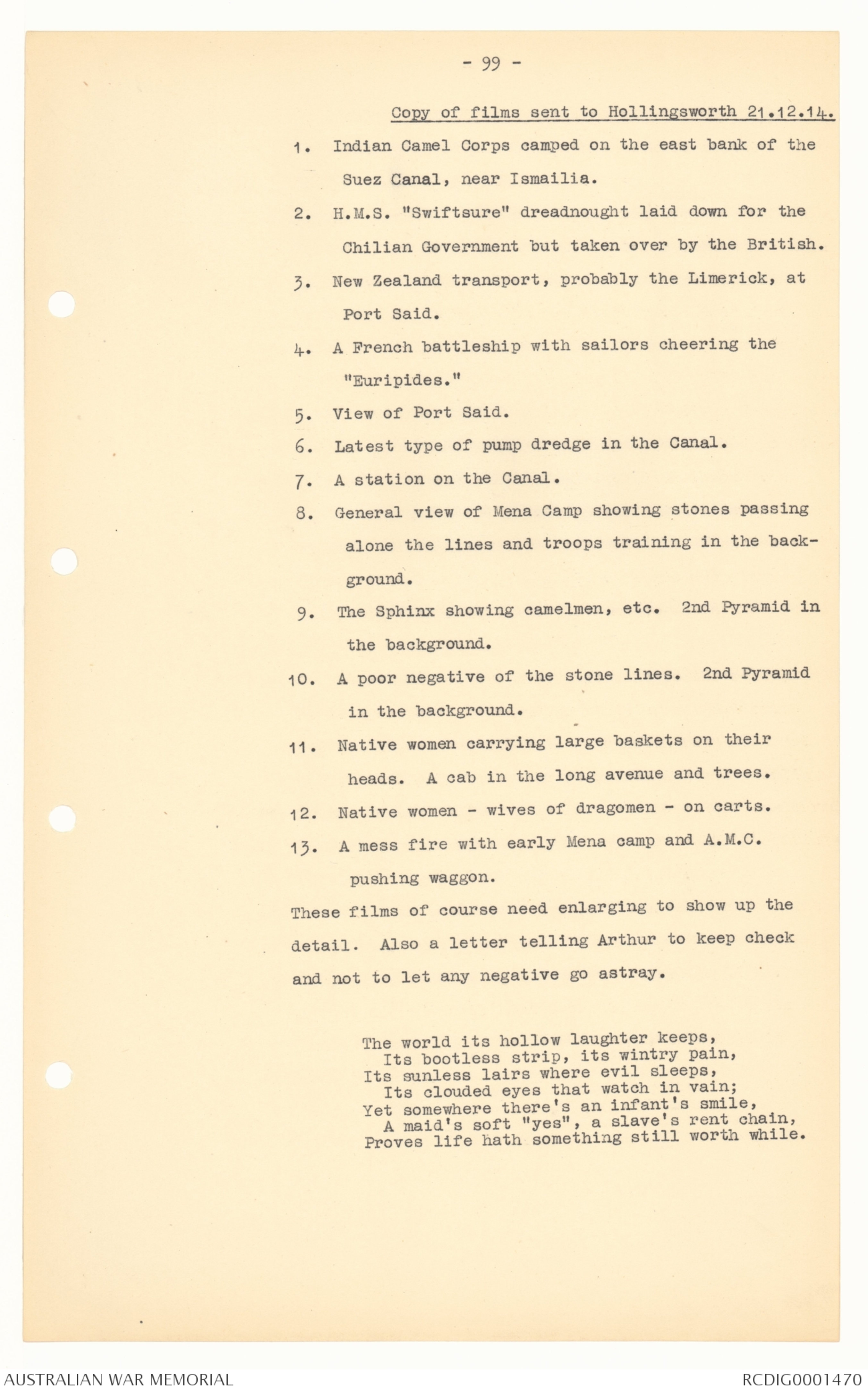
- 90 -
6 o'clock in the morning. Bob Miller and I after many
changes found some blankets on a big gun carriage and
got into a waggon after rolling some bales of blankets
out. We had perhaps 3½ hours sleep. We wandered
around the city several times and admired the architecture
immensely. The flat system seems much in evidence.
The lower class people live, and look like dogs. It is
astounding to see the weights the native women carry on
their heads. Even mere children, not more than 11
years of age, can carry a kerosene tin of water filled
to within a few inches of the top, and after a few
struggles get it balanced and can go a long way without
any appearance of fatigue. The women of a little better
class wear veils and slippers. Whether with stockings
or not they have silver anklets and bracelets. The
carriage of all the women is extremely easy and smooth like.
It is a treat to see a natural walking female
after the hobbled, stunted, unnatural gait of our
womenfolk.
The "dragomen" had a race to get into the
station for work, and there never was such a row
and rattle of springless drays, drawn by donkeys,
mules and horses. The strength of the donkeys is
wonderful and to ride they seem very pleasant and
amble along finely.
12th December, 1914. Letter from W.T.B.
We left the Territorials' Barracks at
8 a.m. with two horses and walked the 10 miles back
to the camp by 1 o'clock. That long, straight, tree-lined
road seemed never to end; when we entered it
and saw the Pyramids it looked only 2½ miles but it
took 2 hours walking to get to the end, which is
perhaps 6 miles. We had a shave, dinner, a bath
- 91 -
and two lovely hours sleep and walked along to buy
a matting to sleep on. Bob Miller and I saw the mat
we wanted at 15 piastres; there were others at 10
piastres; I work on a system of not having an argument
with these natives, so I turned to Bob and said
"It's the mat we want, Bob, but 10 piastres is as
much as it’s worth. We will have a look at the
others up here." But as usual the native said
"All right, 10 piastres, you have it." So tonight
we expect to keep the cold in the sand from coming
up through the blankets. Nearly all of the Australian
Contingent are now in camp.
I am writing these notes lying on my
stomach and an elbow, with Hucking, Hazlett and Con
O'Sullivan discussing all types of topics.
Mail posted :-
Letters to Bill, W.B., Williams, Morgan.
Cards to Sims, Hynes, Schraders 3, Elvy.
13th December, 1914. We were up at 6 a.m. as usual
this morning and worked right through to 10 o'clock.
After stew for dinner I found there was no parade in
the afternoon and no leave till 4 p.m. so A. G.
Murphy and I decided to run the gauntlet and go
down to the Zoo. We took a cab at Mena for 10
piastres each and got there by 3.20 p.m. There was
nothing extraordinary though the animals were in
excellent condition and the cages kept perfectly
clean and free from the usual smells. The wide
mosaic paths on each side of the road were small
water-worn pebbles of three colours - white, black
and yellow. They were laid on their edges and
formed some very pretty patterns. There must have
been altogether some miles of this work, which was
a monument to the patience of the Egyptians, more
- 92 -
than to skill. A band of 16 young native pipers
with 5 side-drums and a big drum was most interesting.
These were dressed in a red uniform and to show their
best before the onlookers (mostly soldiers) they were
doing their utmost and looking as important and self-conscious
as only natives can. They were all about
14 years of age. It struck me as being strange to
see these highly-coloured fellows with the pipes
above all other instruments. I expect there is some
fascination about the squeaky, squealing pipes that
gets their goat. Murphy and I had dinner at the
Gardens - 4 courses for 8 piastres. We had coffee
on the street-side and by hell the peddlers did bother
us with their hundred and one wares. A fine looking,
well-dressed Spaniard sympathised with us in broken
English and then got into conversation. He told us
that the best Egyptians did not keep more than 1 or
2 wives though there were many harems in Cairo. He
seemed sincere when he stated that English was almost
essential in business. He was plainly pleased at the
sinking of the "Emden" and knows that Britain must
rule the world for the satisfaction of all nations.
We took a tram back home by 9.30 o'clock. I have no
desire to see Cairo at night time again, though I
must see it in the day time.
14th December, 1914. Murphy and I got into camp
easily last night without passes and there were a
fair number of fellows caught and punished. We had
a good afternoon and night but I must cut my expenses
down seriously and only go into the city in the
daytime so that I can see things and make educational
notes. Hell, if I only had taken an interest in my
bit of schooling how much more simple this would be
for me. My photos. may bring me in a few shillings
- 93 -
in Sydney. They cost me 8d. a roll to develop. I
have not had a cigarette for, well perhaps 12 since
leaving Albany 6 weeks ago.
With the bugle calls and brass bands
playing no one can sleep in in the morning - such a
row to wake the men up one never heard. This morning
there were quite four bands playing loud music at
6.15 o'clock.
The day is as hot as a mid-summer's day
in Sydney but with a little more burning heat, I
think.
I had another camel ride while drawing
fodder for the horses this morning. When the camel
started with a rush to rise up on his hind legs first,
I fell right over his head. My next attempt was
safe but the journey was extremely rough. I swung
from the middle until it hurt me.
Tonight my Section is on leave but I am
remaining indoors to write.
15th December, 1914. There is a heavy wet fog hanging
over the Pyramids and camp this morning. The Pyramids
looked like active volcanos as the sunrise glazed
red and streaky through the mist - another of the
novel mystic effects of this weird country.
A batch of fellows from our tent have
been doing hospital duty at Mena House each day.
They object to scrubbing floors while there are
natives roaming about laughing at the white/man working
and again doing so under the supervision of a nurse
or sister hurts them very much. They tell some funny
tales of their doings. Today O'Sullivan tried to
explain that one nurse as old as the Pyramids sent
him for some towels etc. But he said "She's as old
as a pelican." "Anyhow," he added, when questioned,
-94-
"she's as old as the Pyramids and looks like a pelican
with the temper of the Nile in flood."
We drilled all the morning and went with the
stretcher for a march around the Pyramids and the
Sphinx and into the tomb of King Khephren's mother.
The sarcophagus was splendidly fitted and worked up
so smoothly and level. The second Pyramid was
built by King Khephren. The group had their photos.
taken by an Egyptian. I also exposed many films.
I wrote with many interruptions until 9.20,
then turned in.
16th December, 1914. We have been wakened each morning
at 6.15 by some 30 reveilles from our surroundings
and several brass bands playing in great gusto.
I am on duty to-day. We go on at 9.30
a.m. and with 2 hours on guard and 4 hours off stay
in the guard tent for 24 hours, and not allowed to
take off anything when asleep.
All our officers are now in camp and everything
is run on very strict lines, so much so that I
have not been able to meander off around the other
camps for some days.
I find that we are 8 hours, 12 minutes
behind Australian time and I often find myself working
out just what time it is in Sydney and what is going
on there.
17th December, 1914. The new rule of doing guard 2
hours on and 4 off is a damnable arrangement. I did
not get 4 hours sleep and could not collect my thoughts
to write, though I struggled harmlessly with an
article for Sydney papers.
I met Mr. Owen, a representative of the
N.S.W. Y.M.C.A. He is building a large barn-like
- 95 -
reading room for the use of the troops - 80 ft. by
60 ft. The City of Melbourne have one already erected.
Mr. Owen wants his place put up by voluntary labour.
Big Mitchell called twice for me. Sergeant Worthington
has also called on me.
Although I was tired this morning aftersundry SENTRY duties and waiting for my pay, I went for a
wander round to take some photographs. I got up to
the second Pyramids which is "out of bounds." I
waited some time for officers to pass by, then I
started up, not so much with a view to reaching the
top, as to having a good look so that I could return
at another time. But when I got up to the casing and
difficult part I set about reaching the top which I
did, with surprising ease. The view was glorious and
so was the satisfied spirit of conquest. I took
several photos. and prepared to descend as dinner time
was approaching. I found coming down rather difficult
and many times I had to rest a minute to collect
myself, as looking down 450 feet between one's legs
to find a foothold just beneath one is not conducive
to steadiness. The lay of the rock was against seeing
the footholds and openings from the top side so I had to
move gingerly inch by inch. The day was very hot and
I was pleased to get back to the camp for a bath with
a bucket of water stripped in the open.
There is much discontent in the camp at
present over hard and continuous work and short rations.
There is 6d. a man allotted to procure extra food and
there is some doubt as to what is being done with it.
I could go out on leave tonight but would
rather remain indoors and sleep early.
- 96 -
18th December, 1914. Letter to W.T.B. Cards Miller
(2), Davis and Gifford.
I am one of a party at Mena House to-day.
Mena Hotel was a popular, though expensive establishment.
Now it is the headquarters hospital with a
big staff of nurses and men. 20 nurses are there.
There are 17 officers in the hospital sick and the
number of men must be enormous.
I copied a splendid sketch of the big
Pyramid, read the paper and did some writing while
sitting on a soft springy couch outside the office
waiting for orders which never came during the whole
day, nor did I speak to anybody. I just wandered about
or sat at my post. I don’t believe anybody knew
whether I was supposed to be on duty or not.
In reading the New Testament I find in
the "1 Corinthians 14.15" Chapter 11, 7 - "For a man
indeed ought not to cover his head, forasmuch as he
is the image and glory of God: but the woman is the
glory of the man." &c. &c. Chapter 14, para. 34.
"Let your women keep silence in the churches: for
it is not pertaining unto them to speak: but they are
commanded to be under obedience, as also saith the
law."
Yesterday as I was w^aiting for a clear
way at the bottom of the second Pyramid a Sudanese
came along and begged 5 piastres to tell my fortune.
I bartered until he undertook the job for 1 piastre.
with the arrangement that if he did not tell me true
I was to take the money back. The 2½d. was placed
on the ground and covered with dirt. A 4 inch circle
was drawn around and four points marked out. He got
me to make a mark on one point and he counted up to
18 from point to point. He told me that I had some
very good relations who were well-off and could think
- 97 -
I was married and not very happy in consequence. I
had one brother, and plenty of ability and opportunity
in life. A long tale in bad English with nothing of
interest to be said, then he turned and wanted to sell
me a bottle of beer, then some old Roman coins.
I wrote until 'lights out' on an article
for Sydney, which was very hard with a tent full of
noisy men.
19th December, 1914. Another week-end and my thoughts
run away to Sydney and Manly in particular. It is
now 1 o'clock here, which is 8.15 in Sydney and the
band plays to a happy, carelessly -dressed (but
cleanly) crowd of young people.
I have been drawing rations this morning
and the noisy arguments that take place between the
men and native dragomen! The men want to bustle and
get away but the niggers are paid per hour and do not
talk any more English than is suitable to their own
interest. At the 2 o'clock parade we fell out for
passes - those who were not on leave yesterday - for
leave until 11 p.m.
Bob Miller and W. Neve and I went into
town and out to the Citadel, where we visited the
Mosque of Mohammed Ali, or the "Alabaster Mosque"
with its graceful minarets and alabaster, of poor
yellow quality, uncrusted walls. Although this huge
structure was built quite recently, it looks very old
and on the outside the alabaster has even been falling
off the walls. The interior, however, eclipses even
the conspicuous landmark of the two minarets, with
its chandeliers of wonderous size and beauty and
huge circles of electric lamps around the artistic
hall with its pretty and thickly carpeted floor,
handsome windows and lofty dome. We did not remain
- 98 -
inside long but it was grand. The inside did not
look cheap or "made up" like much I have seen in
this and other Oriental towns.
From Mohammed Ali we went down to "Sultan
Hasan" which is a huge place built for Sultan Hasan in
1356-59. It is considered the finest existing monument
of Egyptian-Arabian architecture. It is just
outside and below the citadel. The high bronze door
is of excellent workmanship inlaid with gold monograms
of the Sultan and silver inlaid inscriptions from the
Koran. I will have to go back again as we had no
guide, and it being late we had to rush through.
At dusk - 5 p.m. - we engaged a cab for
an hour and enjoyed the drive around the business
quarter and bazaars in the city. There are yet a
wonderful lot of sights to be done in Cairo and
suburbs.
We met the party who went to the races,
at 6.15 and had dinner, after visiting several overcrowded
houses, at the Metropole Hotel which was not
much, yet hardly as bad as the grumbling and growling
of our party of nine would lead one to believe. Served
in French style was not approved, particularly serving
vegetables in courses before the joints.
Rather worried I left the fellows and went
alone to see some brooches at the jewellers. They
seemed so tawdry that I must wait until daylight.
I want something in bronze or nickel of good taste
but the stuff I saw seemed "brummy", though it is
made in Cairo.
Camp at 10 p.m.
- 99 -
Copy of films sent to Hollingsworth 21.12.14.
1. Indian Camel Corps camped on the east bank of the
Suez Canal, near Ismailia.
2. H.M.S. "Swiftsure" dreadnought laid down for the
Chilian Government but taken over by the British.
3. New Zealand transport, probably the Limerick, at
Port Said.
4. A French battleship with sailors cheering the
"Euripides."
5. View of Port Said.
6. Latest type of pump dredge in the Canal.
7. A station on the Canal.
8. General view of Mena Camp showing stones passing
alone the lines and troops training in the background.
9. The Sphinx showing camelmen, etc. 2nd Pyramid in
the background.
10. A poor negative of the stone lines. 2nd Pyramid
in the background.
11. Native women carrying large baskets on their
heads. A cab in the long avenue and trees.
12. Native women - wives of dragomen - on carts.
13. A mess fire with early Mena camp and A.M.C.
pushing waggon.
These films of course need enlarging to show up the
detail. Also a letter telling Arthur to keep check
and not to let any negative go astray.
The world its hollow laughter keeps,
Its bootless strip, its wintry pain,
Its sunless lairs where evil sleeps,
Its clouded eyes that watch in vain;
Yet somewhere there's an infant's smile,
A maid's soft "yes", a slave's rent chain,
Proves life hath something still worth while.
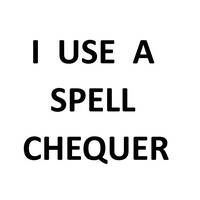 Not Yet Replaced By AI
Not Yet Replaced By AIThis transcription item is now locked to you for editing. To release the lock either Save your changes or Cancel.
This lock will be automatically released after 60 minutes of inactivity.